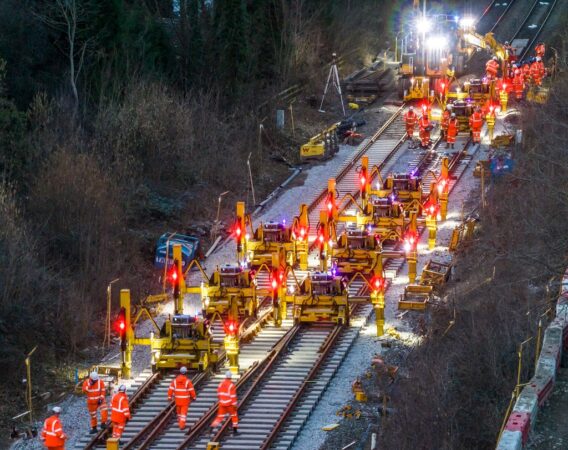Greening the Transpennine Route Upgrade
The over-running programme to improve services between Greater Manchester and Yorkshire has a new sustainability strategy aimed at cutting carbon emissions and delivering social value.
The TRU was originally budgeted at £2.9bn in 2018 and is now expected to cost up to £11.5bn and finish in 2041 instead of 2024.
Work is taking place along the 70-mile rail link between Manchester and York, and is designed to increase reliability and frequency of services.
Last week, the government announced that Transpennine Express[1] would become the sixth train operator in the UK to be effectively nationalised and run by the ‘operator of last resort’ following unacceptable levels of cancellation. ScotRail, SE Trains, Northern, Transport for Wales, LNER are already in the hands of the operator of last resort. In March, Avanti West Coast was granted another six months to run the west coast mainline connecting the North West with London until 15 October 2023.
The sustainability plan, titled ‘Our Guiding Compass[2]’, includes:
- mitigating negative environmental impacts during construction
- enhancing natural environment surrounding the route
- 4,000 new roles during construction
- with 60% of the workforce employed from within 25 miles of the route
- and 80% within 40 miles
- 20% will be from underrepresented groups to create a diverse team
The proposed reduction in carbon emissions would be equivalent to taking six million cars off the road for a year.
Huw Merriman, rail minister, said: “Sustainability is at the heart of the Transpennine Route upgrade – delivering faster and more reliable electrified services in the North in a way that’s also better for our environment.”
Anna Humphries, head of sustainability and social value for the Transpennine Route Upgrade, said: “We have a once-in-a-generation opportunity to make a real impact on the lives of those who live in the North of England and ‘Our Guiding Compass’ puts in writing how we intend to do that.”
Rob Warnes, strategic development director at Northern Trains, said: “The Transpennine Route Upgrade will be transformative for our customers, enabling us to run greener, faster trains and slash our carbon emissions.”

Workers are being sourced locally, the government says. Credit: Network Rail
The environmental benefits include:
- 90% of construction waste to be recycled
- 99% of all non-hazardous materials diverted from landfill
- 10% net gain of biodiversity
- 6 million tonnes of CO2e saved over a 60-year period after work is complete
- 10% net gain of biodiversity
The estimated $4.28bn social value breakdown:
- £715m from buying goods and services from local business within a 25-mile radius
- £1.6bn from creating and safeguarding jobs and employing local people
- £29m through employing apprenticeships
- £338m through engaging students in inclusive education and routes into rail
- £1.5bn through reducing operational carbon by electrifying the route and shifting away from cars on the road
References
- ^ Transpennine Express (www.placenorthwest.co.uk)
- ^ Our Guiding Compass (eur02.safelinks.protection.outlook.com)
